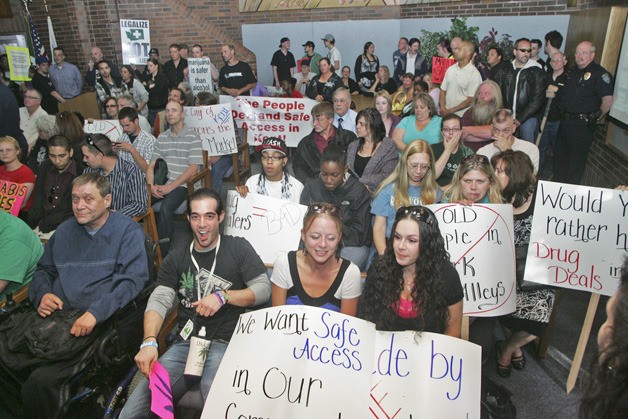Medical marijuana drew another standing-room-only crowd in the Kent City Council Chambers for a public hearing addressing the city’s six-month moratorium on collective gardens and dispensaries.
More than 150 people packed the chambers Tuesday night for the hearing with many more outside in the City Hall lobby.
Prior to the meeting, the medical marijuana supporters met at Evergreen Holistic Center, 204 Central Ave. N., for a rally, then walked to City Hall for the City Council meeting.
The city passed a moratorium July 5 on a 5-2 vote with Councilman Dennis Higgins and Councilwoman Elizabeth Albertson in dissent.
The measure was passed as an emergency bill, which meant it went into effect when it was passed by council and signed by the mayor.
State law required the city to schedule a public hearing within 60 days following the vote.
The day after the moratorium was passed the Kent Police served search warrants and collected evidence at the four medical marijuana dispensaries located in the city.
The city sent a letter to the businesses June 3 informing each they were violating state law and requiring them to close.
Prompting the moratorium was a state law allowing for collective grows or gardens. The portion of the bill legalizing medical marijuana dispensaries was vetoed by the Gov. Chris Gregoire because she believes it made state workers subject to criminal charges.
According to the city moratorium ordinance, the governor also vetoed the part of the bill, “regarding the manner in which the collective gardens are to be regulated. This has resulted in a very confusing legal landscape which cities must now negotiate.”
Following the hearing, Deryck Tsang, owner of Herbal Choice Caregivers, and Charles Lambert, owner of Evergreen Holistic Center and a candidate for City Council Position No. 5, said they would be opening again in Kent as collective grow operations.
Lambert said on the advice of his attorney, Douglas Hiatt, he will be opening Monday.
Hiatt said, “My clients are going to be in compliance with state law that goes into effect (July 22),” Hiatt said. “There is no provision for a moratorium. The moratorium has no force or effect. It is illegal.”
According to Hiatt, if the city closes the business down he plans to fight the action in court.
“If they bust my client we’ll go to court and we’ll find out if there is a moratorium or not,” he said.
The moratorium ordinance stated the city has the authority to “regulate these collective grows through zoning, licensing and taxing.”
Tsang said he plans to reopen and take the risk of being shut down again.
“We’re not criminals,” Tsang said.
Jessica King, owner of Suzie Q’s, said she hasn’t decided if she will reopen.
“The law is what it says and it is up to our city to abide by the law,” King said. “And what they’ve done, forcing the emergency moratorium is illegal. They need to uplift it immediately.”
During the public hearing nearly 20 spoke, all in support of medical marijuana and ending the moratorium. Many spoke about the relief they receive from marijuana treating symptoms from various illnesses including cancer and neurological diseases.
Dawn Nelson said she has lived in Kent 20 years and stated she has cancer.
“I’m not a criminal,” Nelson said. “I’m a mother, a wife, a daughter, a sister, an aunt, and I’m also a medical marijuana patient. I have stage 4 cancer diagnosed Oct. 17, 2007, my 39th birthday. I was given three weeks to two years to live. I’m going on three and a half years with the help of medical marijuana.”
Lambert said during the hearing, “These people, you do not know them. I do, on a daily basis. I see what it does for them.”
Phillip Dawdy, who worked with the Washington Cannabis Association during the legislative session, said the collective grow legislation was “never meant to be caught up in regulation by the city. It was meant to be a much more casual arrangement. We were essentially codifying what has been casually called grow over the years.”
City Attorney Tom Brubaker stated at the meeting that whatever regulations the city adopts, none will “guarantee the legality of any medical marijuana operation under state law or federal law. That risk will remain with the owners, operators, providers and patients.”
Marijuana continues to be illegal according to federal law. The U.S. Drug Enforcement Administration lists it as a Schedule 1 narcotic.
The DEA has closed down medical marijuana facilities in Spokane this year.
Talk to us
Please share your story tips by emailing editor@kentreporter.com.
To share your opinion for publication, submit a letter through our website https://www.kentreporter.com/submit-letter/. Include your name, address and daytime phone number. (We’ll only publish your name and hometown.) Please keep letters to 300 words or less.

